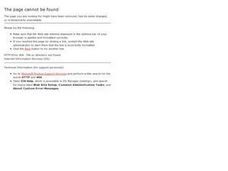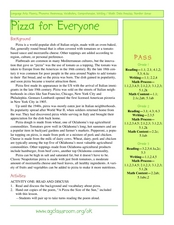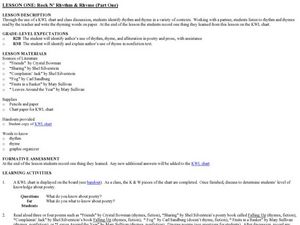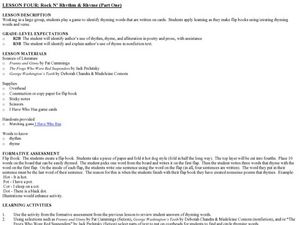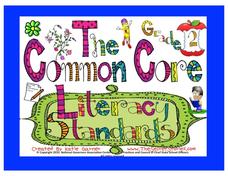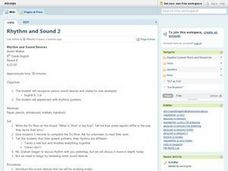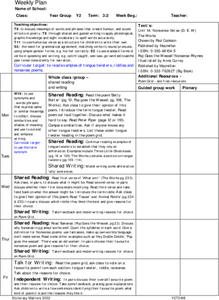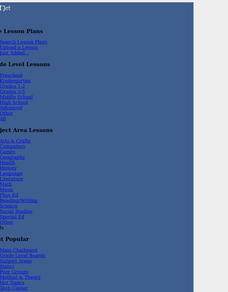Curated OER
Senior English Beowulf Test
The first thirty-seven questions on this assessment check for knowledge of the events in Beowulf. The short answer prompt asks readers to identify five characteristics of an epic and to give examples from Beowulf in support. Finally,...
Curated OER
Focus on Figurative Language
Using the poems "First Snow" by Ted Kooser and "Eating Alone" by Yi-Young Lee (or other suggested poems by Robert Frost or Sara Teasdale), middle schoolers search for examples of figurative language. Guide your learners by discussing...
Curated OER
Figurative Language: Simile and Metaphor
What is figurative language? Introduce your young learners to the most popular forms of figurative language: the simile and the metaphor. Start by reading "Willow and Ginkgo" by Eve Merriam, and identify where similes are used. Then look...
Curated OER
Where's Walden and Why Henry?
Sixth graders understand how Thoreau can serve as both inspiration and model for the investigation of home places. They explore ways to become better observers of natural and cultural history. Students find out how to connect with their...
Curated OER
A Courtin' We Will Go
Students investigate dialect in poetry as an indication of a people's culture in literature. They write a poem about dating in this era.
Poetry4kids
How to Write a Tongue Twister
Betty Botter and Theophilus Thistle provide models for willy writers to wrestle words into tricky tongue twisters.
Curated OER
Dali & Desnos
Students explore surreal art and poetry. In this visual arts lesson, students examine works by André Breton, Robert Desnos, Salvador Dalí, and Joan Miro. Students then apply the techniques in the works they analyze to their own poetry.
Curated OER
Language Arts: Stylistic Devices
Students are able to define given literary terms, such as metaphor, simile, imagery, personification, symbolism, etc. They are able to identify the use of literary elements in a given text. Students are able to interpret weather...
Curated OER
A Prelude To Beowulf
Students study the literature and literary techniques of the early Middle Ages, thus preparing students to read Beowulf with an appreciation for its artistry and beauty. Students solve online riddles, write riddles and study Anglo-Saxon...
Curated OER
Rock & Roll through Literary Terms: An Upbeat Lyrical Adventure
Learners participate in a variety of activities surrounding Rock & Roll music, lyrics, drama and visual art and how they all help demonstrate examples of literary terms. They use Rock & Roll as an effective aid to stimulate their...
Curated OER
Pizza for Everyone
Pizza is the inspiration for the cross-curricular instructional activity detailed here. Start out with a poem about pizza and move into a discussion about balanced eating. To close the language arts portion of the instructional activity,...
Curated OER
Pond Theme Unit
For this pond theme worksheet students research facts on pond life. Students complete comprehension questions, crosswords, word search, and math puzzles. Students write a short report.
Curated OER
Ice -T's Rap School
Students research the history of rap and gain an understanding of the components of rap music. They experience the correlation between Shakespeare's poetry and rap music of today.
Curated OER
Beginning with Bosch
Students explore surrealism through the artwork of Hieronymus Bosch. In this surrealism instructional activity, students understand the characteristics of the art of Bosch and create an original artwork and poem to go with it.
Curated OER
Lesson One: Rock N Rhythm & Rhyme (Part One)
Second graders listen to poetry to find rhyme and rhythm. In this poetry lesson, 2nd graders listen to different types of poetry and find how they are alike. They look for rhyming words and create their own rhymes.
Curated OER
Rock N Rhythm & Rhyme (Part One)
Pupils make flip books of rhyming words and match words together that are on cards. In this rhyming lesson plan, students read books and read individual words to identify rhyming words.
Schools United to Provide Enhanced Resources Network
AP English Project: Journal of Literary Terms and Devices
To prepare for the AP English exams, individuals are asked to create a notebook of literary terms and devices. The terms must be defined, accompanied by representative artwork, and illustrated by an example drawn for a named source. A...
Curated OER
The Common Core Literacy Standards - Grade 2 Posters
Support second graders with mastering the Common Core using this series of classroom displays. With each English language arts standard rewritten as a We can statement and accompanied by images and examples, this resource provides young...
Curated OER
A P Literary Terms
Is a list of literary terms found frequently on AP English exams of value to test takers? Now there's a rhetorical question. Here's a list that provides definitions for everything from allegory to vernacular. To say the list is of value...
Pittford Schools
Literary Devices, Techniques, and Elements
What's the difference between a speaker and an author? What's an example of anthropomorphism? Clarify the meanings of literary devices, elements, and techniques with a comprehensive glossary of terms.
Curated OER
Rhythm And Sound 2
Students review the concept of rhythm and this lesson looks at some specific sound devices in the study of music. They focus on assonance, consonance, and alliteration. Students define the concept of rhythm and give poetry as an example...
Curated OER
Tongue Twisters
Second graders read the poem, "Betty Botter" and give their opinion of it. They discover what a tongue twister is and read the poem out loud together. Then as a class they read "Peter Piper" and discuss the similarities of the two poems.
Curated OER
Figurative Language Scavenger Hunt
Eighth graders analyze and interpret figurative language. They listen to some examples of poetry which use figurative language. Then, they divide into groups and attempt to find more examples. Finally, 8th graders write what the poet is...
Curated OER
Vocabulary Multiple Choice Worksheet 9
In this ESL vocabulary worksheet, students will focus on vocabulary enhancement. Students will complete 10 multiple choice questions, by reading each sentence and choosing the best word to complete each.





